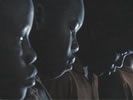Eye For Film >> Movies >> The Silent Army (2008) Film Review
"Africa is no better or worse than any other continent," protests one of the characters in this film, and in many ways it's a fair pint, but still Africa is a reliable source of stories that horrify the rest of the world. Few make more of an impact than that of child soldiers. But what has been missing from their story, as told in the news media and on cinema screens elsewhere in the world, is an African perspective. Whilst this film was made by Dutch people, with a popular Dutch singer in the lead, it was shot in South Africa featuring a largely African cast and it gets much closer than its predecessors to capturing African viewpoints. It is a story where corruption doesn't stop at the boundaries of the continent, and it has as much to say about international politics as about the ugliness of child exploitation itself.
Marco Borsato, bringing an impressive raw quality to his first acting role, is Eduard, a middle class restaurant owner living with his young son Tomas in a thinly disguised Uganda. Tomas' best friend is Abu and the two are inseparable, there to help each other in difficult times but mostly running around shouting and playing like any boys that age. Tomas may go to school and Abu may have to wait until he has helped his parents with the harvest, but they are too young to care about these differences themselves. When Abu's home is raided in an attack by the Lord's Resistance Army and the boy is carried off, Tomas grows desperate for his friend's welfare, unable to understand why adults take such horrors in their stride. He persuades his father to try and help, and Eduard is gradually sucked into a situation he could scarcely have believed in before, a brutal world which, he must ultimately acknowledge, has been around him all the time.

The use of a white lead in a story like this is controversial, but Borsato took the role hoping he could use his popularity to bring these issues to the attention of a new audience, and he does a good job of translating the situation for viewers unfamiliar with the culture and politics in which the story is rooted. The complex moral issues surrounding the involvement of middle class white people in African politics are given a thorough airing, with the emphasis ultimately on the importance of taking action ("It's what we do, not why we do it"). This doesn't mean that the film is quick to forgive poorly thought-out action, and the naivety of those who rush in to try and help only to get in the way is also treated bluntly.
The other thing that comes across strongly here is the perspective of the children themselves. We see a lot of Abu and the other kids he meets after his capture, and their naturalistic performances help us to connect more closely with their experience of brutalisation. This wouldn't be an easy film for young children to watch, but many teenagers will find that it addresses its subject in a way they can relate to. It's not just about children as objects to be mocked, pitied and fought over by adults - it's about children whose greatest suffering comes from their awareness of their own agency and the moral compromises into which they find themselves forced.
With all this going on, The Silent Army can't help but be interesting. The technical work doesn't always match the quality of the rest, but for a low budget film it acquits itself fairly well. Unfortunately, in aiming to capture the confused realities of conflict, the film is sometimes hard to follow just at the points where viewers will be most anxious to follow characters' fates closely, and there are one or two unfortunate lapses into cliché, particularly in regard to the female characters. As the rebel leader, Abby Mukiibi Nkaaga gives a suitably charismatic performance well balanced between brutality and charm, and this is almost enough to carry the film through its difficult final scenes, but ultimately it doesn't quite achieve what it might have done. Nevertheless, it's well worth checking out.
Reviewed on: 03 Feb 2010


















